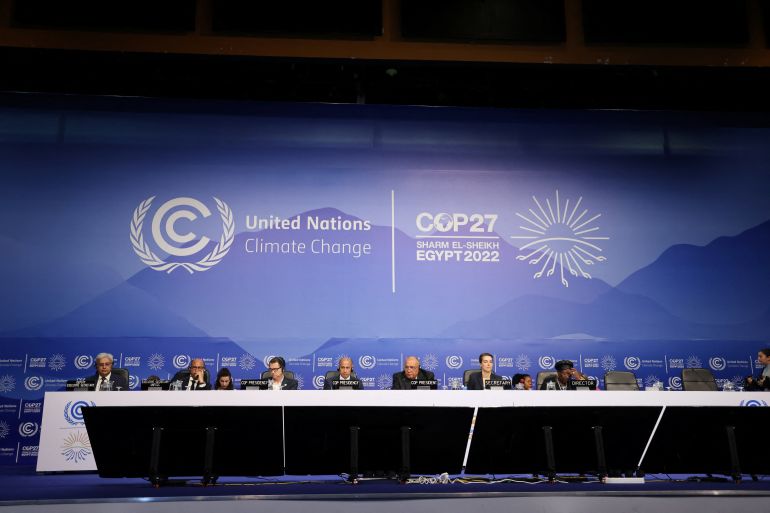‘Loss and damage’ negotiations dominate COP27’s final day
Crucial climate talks in Egypt to run past deadline as key issues including funds to help victim nations remain pending.

Global climate talks have entered the final scheduled day of negotiations as chances of a deal still look unclear.
The United Nations’ Climate Change Conference (COP27) in Egypt was expected to go past its deadline on Friday and into the weekend, with rich and developing nations deadlocked over creating a fund for countries devastated by the effects of global warming.
Keep reading
list of 4 itemsCOP27: Is energy security compatible with decarbonisation?
Climate disaster aid scheme ‘Global Shield’ launched at COP27
Can a human rights campaign during COP27 free Alaa Abd el-Fattah?
The Egyptian presidency on Friday morning released a new, slimmer draft for an overarching cover document after a 20-page version released a day earlier had been criticised for being too long, vague and confusing.
Among some of the most pressing topics was the European Union’s proposal to tie compensation for climate disasters to tougher emissions cuts, two of the thorniest issues at the meeting.
The two-pronged approach from the 27-nation EU would create a pot of money for poor countries and push for steeper cuts of heat-trapping emissions by all countries, as well as the phasing out of all fossil fuels, including natural gas and oil.
EU climate chief Frans Timmermans said the bloc’s proposal on funding for loss and damage and mitigation was “a final offer” that sought to “find a compromise” between countries.
In climate negotiations, loss and damage refers to the idea that rich nations, which have historically done the most to contribute to climate change, should compensate the developing countries most affected.
Mitigation refers to efforts to slow global warming, like drastically reducing emissions of greenhouse gases.
Timmermans said he was “encouraged” by the immediate reaction to the proposal and more engagement was expected on Friday.
“This is about not having a failure here,” he said. “We we cannot afford to have a failure. Now, if our steps forward are not reciprocated, then obviously there will be a failure. But I hope we can avoid that.”
‘No money in the world’
Germany’s foreign minister said the European Union is serious about delivering climate justice for poor countries suffering disastrous effects of global warming, urging other major polluters to put up or shut up when it comes to providing financial support for those in need.
“We’re making clear that Europe is on the side of the most vulnerable states,” German Foreign Minister Annalena Baerbock said. “Others can now show which side they are on. Spending money is not an end in itself, but it is about ensuring justice.”
Baerbock acknowledged that industrialised countries who were “mainly responsible for global warming up to now should also pay for the damage and losses as a matter of priority”.
But she warned excluding key polluters and not also requiring them to cut their emissions would “be a totally wrong incentive system”.
Baerbock added unless emissions are reduced more steeply, “no money in the world could pay for the damages and losses of the future”.
‘Deafening silence’
Other big players were staking out their positions after the EU’s offer. Deals at COP27 must be made with support from all of the nearly 200 countries at the talks.
China, which had been quiet during much of the talks, and Saudi Arabia both said the money for a loss and damage fund should not come from them. Developed countries should foot the bill, China said.
Both also insisted the 2015 Paris Agreement that aims to limit global warming to an ambitious 1.5 Celsius (2.7 Fahrenheit) increase should not be altered.
As for the United States, there was “a deafening silence” after the EU revealed their proposal, said Preety Bhandari, a senior adviser on climate finance at the World Resources Institute.
“So I assume overnight and during the course of the day there will be a lot of diplomatic outreach across various parties to finally help us land the decision on funding for loss and damage here at COP27.”
‘Shying away’
Loss and damage has become a flashpoint at the climate talks that started two weeks ago. Poorer countries bearing the brunt of climate change, from rising sea levels to extreme flooding, have been stepping up the urgency, accusing richer polluters that have contributed the most to Earth-warming greenhouse gas emissions of stalling.
Hours before the EU’s intervention, COP27 President Sameh Shoukry – the foreign minister of host country Egypt – had told reporters that countries were “shying away from taking the difficult political decisions”.
The UN climate agency also published a draft proposal for a loss and damage deal late on Thursday, but the three options laid out for delegates to consider did not yet reflect the EU proposal.
The first option suggests establishing a new fund for climate-vulnerable countries. The second posits delaying the decision on a fund until next year’s COP28 summit. The third calls for deciding on funding arrangements at COP28, with no mention of a new fund.
Climate-vulnerable countries insist that they cannot wait another year for the creation of a fund to pay compensation.